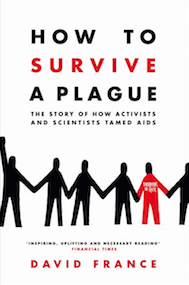Book: How to survive a plague

What better moment to read David France's masterpiece, 'How to survive a plague: the story of how activists and scientists tamed AIDS'? If you assume this 2016 book about the 1980s is a matter of historical interest, think again: the same physician who prevented thousands of HIV+ people from getting access to the drugs they needed is now the White House's coronavirus "expert".
Even seven years after the first cases of AIDS appeared in the United States in 1979, Doctor Anthony Fauci stopped the testing of drugs that might have postponed or prevented the deaths of thousands of gay people, haemophiliacs and people who had become HIV+ through a tainted blood transfusion.
Moreover, Fauci made sure information was not circulated to doctors across America, meaning that HIV+ people had to become experts, researching pharmaceuticals and remedies (before the Internet) and lobbying their physicians to prescribe medicine that was hard to obtain. (For more on this, see the Oscar-winning film, "Dallas Buyers Club" for an inspiring portrait of how ill people came together to circumvent the bureaucrats preventing them from getting life-saving medicines). Even advice to wear a condom was unacceptable to the authorities because of the sensibilities of the religious right and the indifference of those in power to the suffering of people who were HIV+. Hospitals were still using tainted blood years after it was clear there was a problem.
For those who are interested in how citizens can organize, advocate and take power, this is a life-affirming read. The gay community in cities across America quickly established networks of volunteers to feed and support people with AIDS, making their illness and deaths less appalling, had they been left alone. This is also the story of how individuals and lobbying groups clashed and finally came together to press lawmakers and officials to change their policies. The first flexing of LGBT muscle is apparent in these pages, perhaps explaining why, decades later, it was possible to succeed in the push for marriage equality, etc.
Why were American officials reluctant to allow the spread of information or drug testing? Partly, France suggests, it was because some of the doctors involved seemed to care more about claiming credit for making scientific breakthroughs on the cause of the virus and reaping the financial benefit from registering copyrights. The drug companies were also guilty of astonishing opportunism, charging world-record prices for pharmaceuticals like AZT, even though the vast majority of the development costs had been paid by the federal government. Progress in stopping the plague was imperiled by arrogance, ego and greed, as France puts it. More than 600,000 Americans died horrible deaths.
The other reason AIDS was never a priority in the first eight or nine years following its appearance, was a hatred and fear of homosexuality in many parts of the USA. A shocking degree of cruelty was displayed by high-profile medical institutions toward gay patients. Staff refused to feed them, touch them or change their sheets when they lay for days in their own feces. Thousands died in astonishing pain and humiliating misery as a result. Some hospitals, like the world-famous Sloane Kettering in New York, wouldn't even admit people with AIDS. President Reagan continued to laugh in public at jokes in which the punchline was the death of homosexuals.
Reading this book in 2020, when gay marriage is legal in an increasing number of countries, it is depressing to be reminded of the loathing and superstition about "alternative lifestyles" shared by vast numbers of people. One is also prompted to wonder how much has really changed in the hearts of those who mocked ill gay men or picketed their funerals. Will the pendulum swing back to a time when people openly expressed their intolerance and hatred?
The only gaping hole in this extraordinary book is the absence of any interest in what was happening in Africa. There have now been 35 million Africans infected with HIV, of whom 15 million have died. Yet, in more than 500 pages, France mentions Africa only twice in passing. His aim was to describe the situation in the USA, which he does admirably, but he shows no curiosity about the origins of HIV (in Africa) or the greatest devastation from the plague, which continues to destroy lives on the continent.
Is this book relevant to the current coronavirus pandemic? The grossly inadequate response to AIDS was largely a reflection of society's lack of compassion for gay people (and Africans). It now seems that the incompetence of officials and the opportunism of politicians (certainly the case in the USA) is delaying effective policy-making and implementation. Let's hope some lessons have been learned from AIDS, SARS and Ebola. Let's also hope the pharmaceutical companies react in a less predatory manner this time.
HOW TO SURVIVE A PLAGUE by David France, is published by Macmillan


















